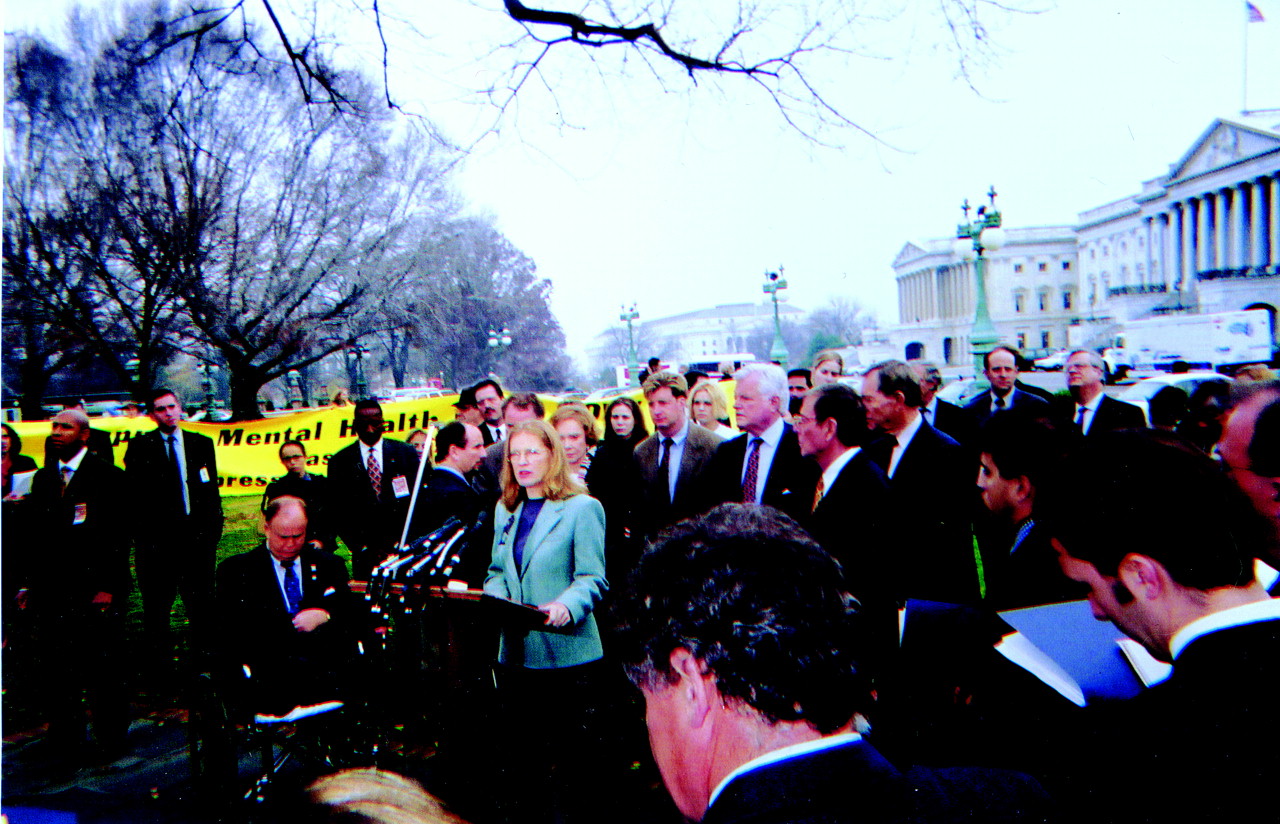APA Joins Lawmakers, Advocates To Demand Passage of Parity Bill

Author and patient advocate Kathy Cronkite describes how treatment for depression helped her reclaim her life at a rally for mental health parity on Capitol Hill last month. Behind her are Sen. Paul Wellstone (D-Minn.), former First Lady Rosalynn Carter, Rep. Patrick Kennedy (D-R.I.), Sen. Edward Kennedy (D-Mass.), and Sen. Pete Domenici (R-N.M.).
“This is where the rubber meets the road,” said Sen. Pete Domenici (R-N.M.), lead sponsor of the Mental Health Equitable Treatment Act (S 543) with Sen. Paul Wellstone (D-Minn.). “The time is now to pass significant mental health parity legislation.”
The sponsors of the bill, which the Senate passed last month as an amendment to an appropriations bill for Fiscal 2002, have encountered opposition from House conferees, who continue to complain that the measure will drive up health insurance premiums. Members of the House favor a two-year extension of the enforcement provisions of the 1996 parity law, but that law expired in September. It prohibited discriminatory lifetime and annual dollar limits on treatment for mental illness in plans that covered both “physical” and mental illnesses.
However, the Congressional Budget Office estimated that the Domenici-Wellstone bill would increase health care costs for group plans by only .9 percent in spite of its being more comprehensive than the 1996 law.
The Domenici-Wellstone bill prohibits copayments, deductibles, coinsurance amounts, and hospital days and outpatient visits for the treatment of mental illness that are different from those for other medical illnesses (Psychiatric News, November 16).
The legislation, however, has its shortcomings. The bill does not mandate coverage of mental illness in health plans or apply to substance abuse benefits. It also exempts companies with fewer than 50 employees and allows mental health benefits to be managed through medical-necessity criteria and utilization review.
“The future of mental health care in America hangs in the balance with this conference report,” said Sen. Paul Wellstone (D-Minn.) “We cannot allow a small number of opponents to secretly stop this legislation from going forward. It is time that all Americans get the health care coverage they need and deserve.”
Rep. Patrick Kennedy (D-R.I.) and Sens. Edward Kennedy (D-Mass.), Craig Thomas (R-Wyo.), Harry Reid (D-Nev.), and William Frist, M.D. (R-Tenn.), also attended the rally in support of parity.
Edward Kennedy recalled that his brother and former president John F. Kennedy emphasized to Congress in 1963 the importance of increasing mental health coverage to meet the need for services for all citizens.
“I say today, 38 years is too long to wait. Americans with mental illnesses deserve justice now. And justice means full parity for mental health care. The time for excuses is over. The time for Congress to do the right thing is now,” said Kennedy.
Patrick Kennedy said, “A majority of senators support parity. A majority of representatives support parity. There is no good reason not to end this insurance discrimination and give American families the health care they need.”
Well-known personalities such as “60 Minutes” reporter Mike Wallace and author and patient advocate Kathy Cronkite described their bouts with depression and the difference treatment made in their lives.
Said Wallace, “I had three episodes of depression, and I tell you that it is a sickness.”
Former First Lady Rosalynn Carter, founder of the Carter Center Mental Health Program in 1991 in Atlanta, said, “There should be no distinction between mental illness and physical illness. If you’re sick, you should be able to get care.”
James Hackett, president and CEO of Ocean Energy Corp. in Houston, said that implementing mental health parity in the employees’ health plan has resulted in greater productivity, less absenteeism, and overall cost-effectiveness.
In a recent press release, APA President Richard Harding, M.D., congratulated Domenici and Wellstone and the 66 bipartisan cosponsors of the landmark Senate amendment for “their tireless advocacy for mental health parity. This is a giant leap forward in ensuring the mental health needs of all Americans can no longer be ignored.”
He also commended Reps. Marge Roukema (R-N.J.) and Peter DeFazio (D-Ore.) for their legislative leadership on mental health issues and sponsorship of a parity bill that also addresses substance abuse benefits. That bill is the Mental Health and Substance Abuse Parity Act (HR 162).
The text of the Mental Health Equitable Treatment Act and the Mental Health and Substance Abuse Parity Act can be accessed on the Web at thomas.loc.gov by searching on “S 543” and “HR 162,” respectively. ▪



